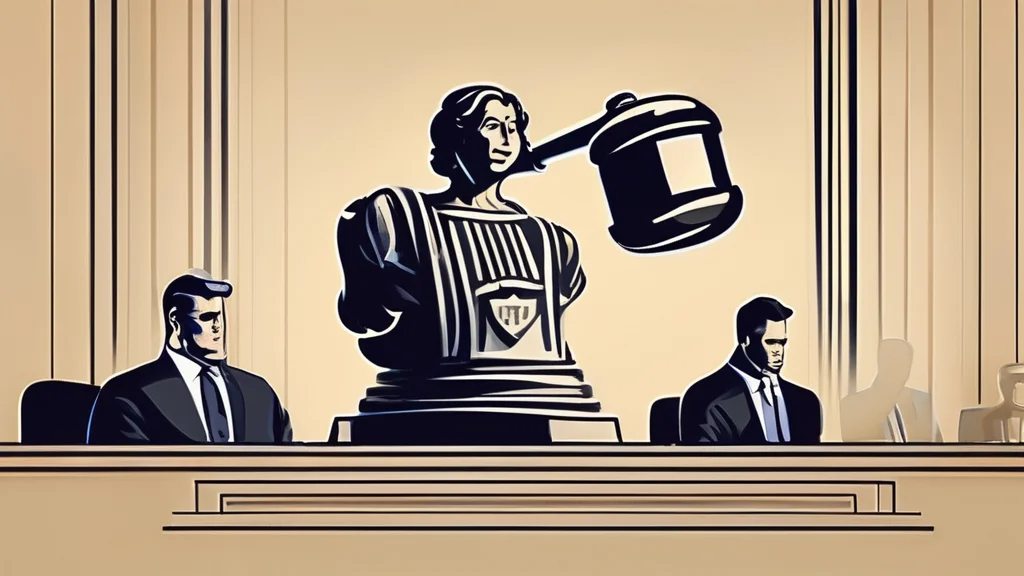The Unsettled Questions of Corporate Oversight: Understanding Meta's $7 Billion Settlement
Exploring the Implications of Meta's Landmark Settlement

- Meta Platforms Inc. settles a $7 billion lawsuit related to the Cambridge Analytica scandal.
- The settlement avoids a landmark trial that could have clarified oversight liability.
- Delaware’s corporate landscape faces tensions between tech leaders and judicial authority.
- The case highlights the complexities and strategic considerations of corporate governance.
Introduction: A Legal Drama Unfolds
Meta Platforms Inc., the tech giant formerly known as Facebook, recently settled a $7 billion shareholder lawsuit just one day into what promised to be a landmark trial. This legal battle centered on the controversial Cambridge Analytica scandal, where Meta’s leaders, including CEO Mark Zuckerberg, were accused of ignoring significant red flags and using investor money to pay a hefty $5 billion fine. Although the terms of the settlement remain undisclosed, this development has profound implications for corporate oversight liability—a legal theory that has eluded definitive judicial clarification until now.
The Case That Almost Was
The trial was set to take place in Delaware’s Chancery Court, a venue renowned for its influence on corporate law in the United States. This case was expected to be a litmus test for the theory of total lack of corporate oversight, a claim no shareholder has yet won. The proceedings were poised to attract testimony from several high-profile figures, including Zuckerberg, former COO Sheryl Sandberg, and venture capitalist Marc Andreessen. Yet, the settlement cut this drama short, leaving the legal community and corporate leaders alike yearning for clarity on oversight liability.
The Stakes and Players
At the heart of this case was an allegation that Meta’s leadership, by ignoring critical risks, breached their fiduciary duties—responsibilities that require them to act in the best interests of the company and its shareholders. Columbia University law professor Eric Talley noted that the trial could have offered much-needed guidance on the exposure boardroom leaders face under this liability theory. However, the settlement reflects a familiar pattern: avoiding the uncertainties of a trial by opting for a resolution that shields both parties from potential pitfalls.
A Cultural Cold War
This legal saga is not just a matter of corporate law; it also highlights a broader cultural clash within Delaware’s corporate landscape. Chancellor Kathaleen St. J. McCormick, the presiding judge, has faced criticism from tech leaders like Elon Musk, particularly following her decision to void Musk’s $56 billion pay package. These tensions underscore the delicate balance Delaware must maintain as it navigates the priorities of influential tech companies that contribute significantly to the state’s revenue.
The Settlement: A Strategic Move
While the specific terms of the settlement are confidential, the decision to settle reflects strategic considerations. As retired University of Delaware law professor Charles Elson aptly put it, “No one likes to be a guinea pig for everyone else.” Indeed, taking a case to trial can reveal unexpected vulnerabilities, making settlement an attractive option for both parties.
Political Context
The settlement also cannot be divorced from Meta’s recent political maneuvers. The company has been vocal about its dissatisfaction with Delaware’s corporate statutes, even hinting at a potential relocation if changes were not made. This lobbying effort culminated in a legislative update earlier this year, further complicating the optics of this settlement.
Implications for Corporate Oversight
Despite the trial’s abrupt end, the case still offers valuable insights into the complexities of corporate oversight. According to Southern Methodist University law professor Carliss Chatman, the settlement demonstrates the limits of trying to influence judicial outcomes through political pressure. “There was this idea among people like Musk and Zuckerberg that by bullying the Delaware courts, they could get more of what they want,” Chatman observed. “But what I see is that they’re holding the line.”
The Doctrine of Oversight Liability
The doctrine at the center of this case—oversight liability—remains a challenging area of corporate law. It posits that directors can be held accountable for failing to oversee the company’s operations adequately, particularly when ignoring critical risks. However, as Talley noted, the difficulty in proving such claims gives judges a rationale for dismissing them without appearing to yield to external pressures.
The Road Ahead: Legal and Ethical Considerations
While the settlement may have averted a potential landmark ruling, it also leaves the legal community with unresolved questions. David Kaufman, a partner at Thompson Coburn LLP, suggests that the settlement serves as a case study in how far parties can push before reaching an agreement. “When corporate lawyers are asked, ‘Should I do this? Should I not do that?’ the answer is usually, ‘You need to do what other directors do in like circumstances,’” Kaufman explained.
The Role of Judicial Discretion
The discretion exercised by judges like McCormick in these cases is crucial. University of Pennsylvania law professor Jill Fisch highlighted that, given the advanced stage of the litigation, the settlement likely reflects what the parties realistically expected to prove. “All of the work has been done,” Fisch remarked. “I would expect this settlement to be more closely tied than usual to what the parties actually expected to be able to prove.”
Conclusion: A Settlement with Lessons
In closing, while the Meta settlement leaves many questions unanswered, it underscores the intricate dance between corporate governance, legal accountability, and political influence. As companies continue to navigate these murky waters, the need for clearer judicial guidance on oversight liability remains urgent. This case, though resolved, serves as a reminder of the ongoing challenges in holding corporate leaders accountable. As the legal landscape evolves, stakeholders must remain vigilant and proactive in addressing these complex issues.
Call to Action
What are your thoughts on the implications of this settlement for corporate governance? Should companies be more transparent in their dealings to avoid such controversies? Share your insights and join the conversation.